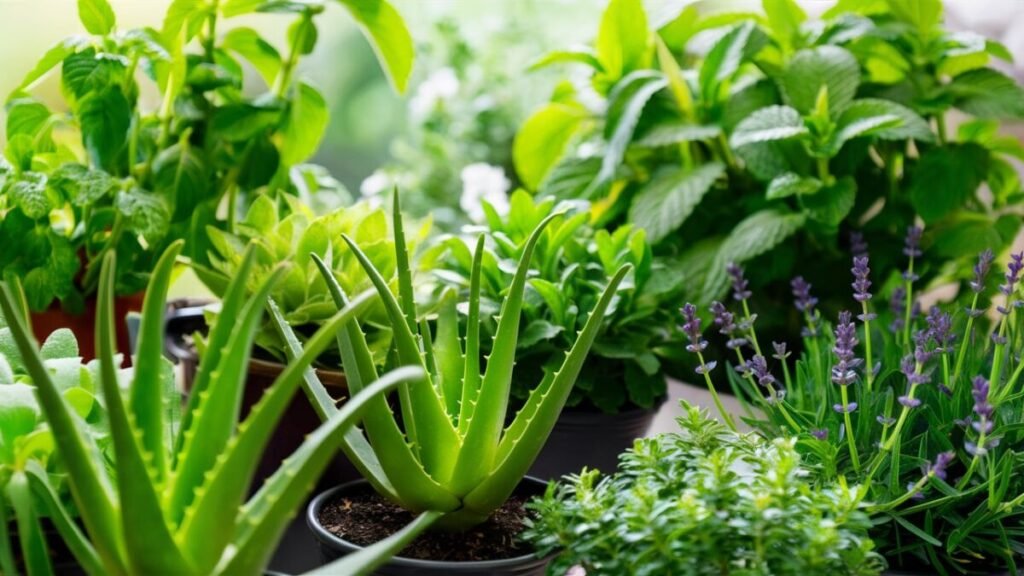As a seasoned pepper with decades of cultivating indoor gardens, I’ve discovered that keeping a few crucial medicinal herbs nearby can be a lifesaver.
In this comprehensive guide, you’ll learn how to grow an indoor medicinal herb garden that provides fresh, healing remedies year-round.
Key Takeaways
- Discover the top 20 medicinal herbs perfect for indoor gardening
- Learn easy setup tips for creating an optimal growing environment
- Explore creative ways to use and preserve your homegrown herbal remedies
- Gain valuable insights for troubleshooting common indoor gardening issues
Whether you’re a seasoned green thumb or a beginner, this article will equip you with the knowledge and inspiration to cultivate a thriving indoor medicinal herb garden, ensuring a convenient supply of nature’s remedies at your fingertips.
Table of Contents
Why Grow Medicinal Herbs Indoors?

Cultivating medicinal herbs indoors offers numerous advantages.
Convenience reigns supreme, as you have fresh herbs at your fingertips year-round. Additionally, an indoor garden provides a controlled environment, shielding your plants from harsh weather conditions.
Indoor gardening presents educational opportunities, allowing you to witness the full growth cycle up close. Moreover, these low-maintenance plants require minimal effort, making them an excellent choice for beginners and experienced growers alike.
Container gardening is a perfect way to grow your own food and medicinal plants, even in small spaces like apartments or condos.
Setting Up Your Indoor Medicinal Herb Garden
Proper lighting is crucial for your indoor herb garden’s success.
Position your plants near sunny windows or invest in grow lights to mimic natural sunlight.
Choose well-draining containers and high-quality potting soil to ensure optimal growth. Implement a consistent watering system, as overwatering or underwatering can quickly lead to plant distress.
Lastly, monitor temperature and humidity levels to create an ideal environment for your herbs to thrive.
Check out these tips for setting up your indoor garden effectively.
20 Top Medicinal Herbs to Grow Indoors

1. Aloe Vera
- Known for its soothing and healing properties, aloe vera treats burns, cuts, and skin irritations.
- Requires bright, indirect sunlight and well-draining soil.
- Succulent with thick, fleshy leaves that store water.
2. Peppermint
- Refreshing herb that aids digestion and relieves nausea and headaches.
- Thrives in partial shade and consistently moist soil.
- Spreads quickly, so contain in a pot or raised bed.
3. Lavender
- Renowned for its calming and relaxing aroma, lavender promotes better sleep and reduces stress.
- Needs full sun and well-draining soil.
- Compact growth habit, perfect for small space gardening.
4. Chamomile
- Anti-inflammatory properties make chamomile tea a soothing remedy for digestive issues and anxiety.
- Prefers full sun and well-draining soil.
- Low-growing herb with daisy-like flowers.
5. Echinacea
- Boosts immune system function and helps fight colds and infections.
- Requires full sun and well-draining soil.
- Tall plant with vibrant purple or white flowers.
6. Ginger
- Ginger roots are known for their anti-inflammatory and digestive benefits.
- Thrives in partial shade and consistently moist soil.
- Grown from rhizomes, which can be divided and replanted.
7. Turmeric
- Powerful anti-inflammatory and antioxidant properties make turmeric a superfood.
- Needs bright, indirect sunlight and well-draining soil.
- Grows from rhizomes, similar to ginger.
8. Rosemary
- Versatile herb with anti-inflammatory and cognitive-boosting properties.
- Requires full sun and well-draining soil.
- Woody shrub with evergreen leaves.
9. Thyme
- Aids digestion and has antibacterial and antioxidant qualities.
- Prefers full sun and well-draining soil.
- Low-growing herb with tiny leaves and a strong aroma.
10. Basil
- Rich in antioxidants and beneficial for heart health.
- Thrives in full sun and consistently moist soil.
- Tender annual with various cultivars, including sweet and lemon basil.
11. Lemon Balm
- Calming herb that promotes relaxation and better sleep.
- Needs partial shade and consistently moist soil.
- Spreads quickly, so contain in a pot or raised bed.
12. Calendula
- Anti-inflammatory and antiviral properties make calendula useful for skin conditions and wounds.
- Requires full sun and well-draining soil.
- Cheerful orange or yellow flowers.
13. St. John’s Wort
- Known for its potential to alleviate symptoms of depression and anxiety.
- Needs full sun and well-draining soil.
- Yellow, star-shaped flowers bloom in summer.
14. Valerian
- Natural sedative that promotes better sleep and reduces anxiety.
- Prefers partial shade and consistently moist soil.
- Tall plant with clusters of fragrant white or pink flowers.
15. Catnip
- Relaxing herb that can help alleviate stress and anxiety.
- Thrives in full sun and well-draining soil.
- Mint family member with distinctive square stems.
16. Feverfew
- Effective in reducing migraines and headaches, as well as inflammation.
- Requires full sun and well-draining soil.
- Daisy-like flowers with yellow centers and white petals.
17. Sage
- Potent antioxidant and anti-inflammatory properties make sage a versatile medicinal herb.
- Needs full sun and well-draining soil.
- Woody shrub with fragrant, grayish-green leaves.
18. Parsley
- Rich in vitamins and minerals, parsley is a nutritious addition to any diet.
- Thrives in partial shade and consistently moist soil.
- Biennial herb with curly or flat-leaf varieties.
19. Oregano
- Antibacterial and antioxidant properties make oregano a valuable medicinal herb.
- Requires full sun and well-draining soil.
- Low-growing herb with small, fragrant leaves.
20. Chives
- Nutrient-dense herb that aids digestion and has anti-inflammatory properties.
- Prefers full sun and well-draining soil.
- Slender, hollow leaves with a mild onion flavor.
Not only are these herbs highly nutritious, but they also offer natural remedies for common ailments, making them excellent choices for your indoor survival garden.
Growing Tips & Troubleshooting
Proper care is essential for a thriving indoor medicinal herb garden. Follow these tips:
- Seasonal Care:
- Adjust watering schedules and lighting as needed throughout the year.
- Prune and divide plants as necessary to promote healthy growth.
- Pest Control:
- Regularly inspect plants for pests and treat with organic solutions if needed.
- Maintain good air circulation and avoid overwatering to prevent fungal issues.
- Encourage beneficial insects to help control pests naturally.
- Maximizing Space:
- Utilize vertical gardening techniques, such as hanging baskets or shelving units.
- Practice companion planting to make the most of available space.
- Air Pruning:
- Encourage bushier growth by gently pinching back leggy stems.
- Dealing with Disease:
- Promptly remove and dispose of any diseased plant material.
- Maintain proper growing conditions to prevent the spread of common plant diseases.
- Rotate crops and avoid overcrowding to increase air flow.
Harvesting & Preserving Your Herbs
Proper harvesting and preservation techniques ensure you can enjoy your medicinal herbs for an extended period.
Here are some guidelines:
When to Harvest:
- Harvest herbs in the morning after the dew has evaporated for optimal potency.
- Pick leaves before the plant flowers for the best flavor and aroma.
Drying Methods:
- Air drying: Hang bunches of herbs upside down in a dry, well-ventilated area.
- Oven drying: Spread herbs on a baking sheet and dry at the lowest oven setting.
Making Tinctures/Oils/Teas:
- Tinctures: Steep herbs in alcohol or vinegar to extract their medicinal properties.
- Oils: Infuse herbs into a carrier oil, such as olive or coconut oil.
- Teas: Steep fresh or dried herbs in hot water for a soothing beverage.
Storing Fresh Herbs:
- Refrigerate herbs in a sealed container or plastic bag, with a damp paper towel to maintain freshness.
- Some herbs like basil, mint, and cilantro can be stored for weeks by placing stems in a glass of water.
Getting Creative With Your Indoor Medicinal Herbs
Your indoor medicinal herb garden offers endless possibilities for creativity and enjoyment beyond their medicinal uses.
Here are some inspiring ideas:
- Cooking: Incorporate fresh herbs into your favorite recipes for added flavor and nutritional value. Experiment with pestos, herb-infused oils, and dressings.
- Natural Remedies: Harness the power of your herbs by crafting homemade tinctures, salves, and teas to support your overall well-being.
- Gifting: Share the joy of your herb garden by creating unique gifts like potpourri sachets, herb-infused vinegar, or homemade soap.
- Decor and Crafting: Dried herb bundles, wreaths, and pressed herb artwork can add natural beauty to your living spaces.
- Aromatherapy: Enjoy the calming and invigorating scents of your herbs by making essential oils, candles, or potpourri.
- Edible Landscaping: Incorporate medicinal herbs into your edible landscape for added interest and functionality.
Conclusion
As a seasoned pepper with decades of experience, I cannot emphasize enough the value of cultivating an indoor medicinal herb garden.
Not only does it provide you with a convenient supply of fresh, healing herbs year-round, but it also offers a sense of self-sufficiency and preparedness.
Start small with a few essential herbs, and as your confidence grows, expand your collection to encompass a wide array of nature’s remedies.
Embrace the journey, and let your indoor garden be a source of fascination, tranquility, and nourishment for both body and soul.
With some simple tips and tricks, even urban preppers can enjoy the benefits of homegrown medicinals.


